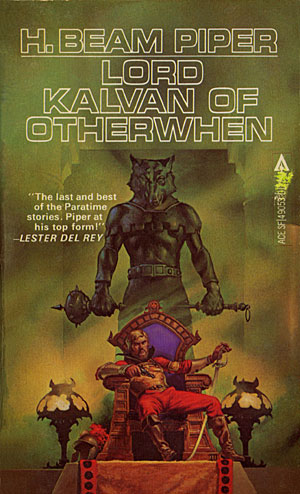There’s a feminine kind of sentimentality which is most often seen in stories about True Love. And there’s a masculine kind of sentimentality which is most often seen in stories about Just War. There’s a moment near the beginning of Lord Kalvan of Otherwhen (1961) where a man charging into battle says “All right you guys, do you want to live forever?” And there you have it, the violins, the heart stirring, the tears in the eyes—my eyes anyway. That kind of thing has a direct and visceral appeal, and nobody does it better than Piper.
This is one of those books that I read when I was twelve (under the British title Gunpowder God) and loved uncritically. It’s hard to overstate just how much fun it is—this is a vastly enjoyable book. It’s military SF with added history of technology, and I think it might have been the first thing on those lines I read, and it set the pattern.
No spoilers.
Calvin Morrison of the Pennsylvania State Police is picked up by a Para-time-machine as a Paratime cop passes through the place where he is. Morrison is carried along by the machine for a little way and finds himself geographically in the same place but in a completely different timeline. He can tell by the mountains and rivers that he’s in the same place, but the absence of civilization is disturbing. (Places are described in terms of their this-world names as well as their that-world names, so it’s possible to use that Google map to follow the action, which is nifty.) At first he assumes he’s in the past, then he assumes he’s in the far future after atomic war has destroyed civilization, and finally he figures it out. I like his plausible but wrong guesses, and the way he makes plans based on them. He has wound up in the little kingdom of Tarr-Hostigos, which is about to be invaded. His military experience (Korean war), knowledge of gunpowder, and the history of military technology quickly gets him promoted to Lord Kalvan. Meanwhile, the Paratime police are having a bad day trying to get all this sorted out.
Piper knows how to tell a story, and there’s exactly the right amount of story here. He doesn’t go on and on with conquests and introducing new technology—he could have, nothing was stopping him but his innate good sense. (Yes, thank you, I do know about the sequels by other hands, but I’m trying to forget.) He does load the deck in Kalvan’s favour in terms of having a world just ready to fall into the grasp of someone who knows the chemical formula for gunpowder. The evil priests of Styphon who have the gunpowder monopoly are awfully evil, the princess is very brave and very beautiful, the cause is good, the timing is right, everything goes down like ninepins. But that can be fun—there are battles and politics but never too much, and besides that, there’s the real threat of what the Paratime police are going to do when they find him. The way it’s generally smooth sailing for Kalvan contrasts with what is in many ways the model for this—L. Sprague de Camp’s Lest Darkness Fall where Padway fails at as many new technologies as he manages to introduce and doesn’t get the girl.
There are a couple of things I winced at in the first chapter—perhaps because I was enjoying it so much after that I missed things. Both of them were in the explanation of the different timelines. Tarr-Hostigos and our world are on the Fourth Level, much more primitive than the Paratime possessing First Level or the high tech Second Level civilizations. Our world is part of the Europo-America cluster—because Europeans settled America. Tarr-Hostigos is in the Aryan-Transpacific. Now Aryan is a linguistic term, and Piper knows this from what he’s doing with Indo-European names and words. But what happened in this history is that white people went east into China instead of west into Europe, and then from China crossed the Pacific and settled America from the west. He does this pretty much entirely so he can have a story set in alternate Pennsylvania with white people. The more you think about this the less it make sense—China’s awfully big, and it would have taken a long time, and they’d have mixed culturally and genetically with Chinese people on the way, and they’d have had those crops at least. And this isn’t a case of a visit from the racism fairy, I remember trying to get my head around the Aryan-Transpacific thing even when I was a teenager.
There’s also a horrible comment about another timeline we don’t see: “Sino-Hindic: that wasn’t a civilization it was a bad case of cultural paralysis.” That’s a standard old-fashioned (and racist!) way of looking at Asian civilizations, and I could have done without it. It was 1961, it’s all just part of the set-up, Piper was generally good in stories set in our future of having characters of all colours and both genders… and I wish it wasn’t there even so. (As far as gender goes Rylla is a kickass princess—she rides and fights like a man, and if she falls in love with Kalvan, well, who can blame her.)
The other paratime stories, collected as Paratime, are also well worth reading.
Jo Walton is a science fiction and fantasy writer. She’s published eight novels, most recently Half a Crown and Lifelode, and two poetry collections. She reads a lot, and blogs about it here regularly. She comes from Wales but lives in Montreal where the food and books are more varied.










